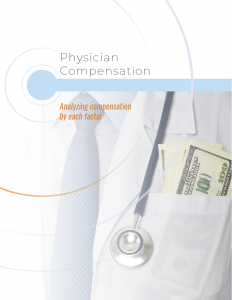Recently, a Family Medicine candidate received two offers, one employer located in Chicago and the 2nd employer located in Rockford, Illinois – a community of 150,000 located 90 minutes to Chicago.
The employer in Chicago offered a starting salary of $165,000 and the employer in Rockford offered $240,000 and a $50,000 sign on bonus. In addition to the significant higher compensation package, the position in Rockford offers a cost of living 20-30% lower than Chicago.
Physician compensation may significantly differ based on your specialty, geographic location, demographic classification (population), practice type, etc.
Below is an excerpt from Physician Compensation – analyzing compensation by each factor.
Medical specialty
It is no surprise that medical and surgical specialists experience higher levels of compensation than primary care physicians. Primary care is generally defined to include family medicine, internal medicine, general pediatric medicine, general obstetrics and gynecology, and geriatrics.
Geographic location
Where you choose to practice medicine has a significant impact on your compensation. That holds true for most professions, but especially for physicians. Consider the following starting salary median data reported by American Medical Group Association (AMGA) in their 2019 Medical Group Compensation and Productivity Survey, for both new residents and experienced providers:
Demographic classification (population)
Nonmetropolitan areas, typically defined as a population base of less than 50,000, tend to experience higher starting salaries in order to attract qualified physicians to work in such rural markets. Metropolitan markets, by definition, can be further stratified into segments of 50,000-250,000, 250,000-1,000,000, and greater than 1,000,000. These different metropolitan markets can among themselves experience varying degrees of starting salary.
Practice type
The type of practice you work in will influence how much compensation you might expect to earn. Typical practice types include:
- Single specialty
- Multi-specialty
- Hospital/health system
- Rural health clinic
- Federally Qualified Health Center
- Academic medical center
- Locum tenens
Different practice types allow for varying status as employed, independent, or partner physicians.
Group practices, especially hospital group practices, whether single specialty or multi-specialty, are usually better able to accept and manage financial risk than solo practices. This may be advantageous to weather the ups and downs of the healthcare industry and changing administrations. Group practices have other benefits such as more physicians to spread the workload and share the burden of overhead.
To learn more about physician compensation click Physician Compensation – analyzing compensation by each factor, co-authored by Brad Reay, CPA is a physician compensation expert at Katz, Sapper & Miller and Phil Schaefer, Senior Vice President at Southern Illinois Healthcare.
_____________________
About Author:
Todd Skertich is the Founder of Adventures in Medicine (AIM), an innovative online media platform designed to present medical residents and job-seeking physicians with high quality career and life planning content and resources.
Also, Todd is the founder and managing partner of Arlington HealthCare (AHC), a physician placement firm. To date he has facilitated more than 2,000 permanent physician placements and helped negotiate over $600,000,000 in physician starting compensation.









